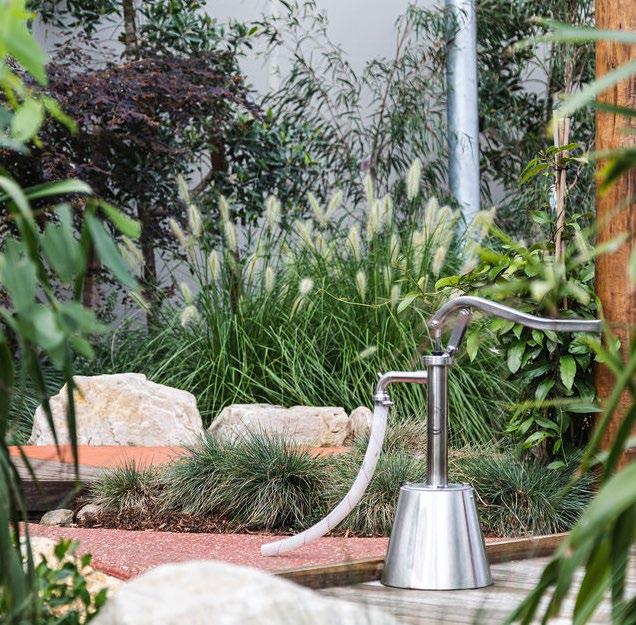
3 minute read
A PRESCRIPTION OF NATURE:
Fostering a generation of happier and healthier children through play
People experience adversity from the moment they are born; babies get tired and restless, toddlers struggle with communication and control, and as children transition into adulthood, life fronts them with countless new challenges.
Advertisement
While spending time at the local playground or exploring the national park seems like a simple family outing, as a father of two children and co-founder of Wearthy, the experts in outdoor play, I believe play can be so much more than that.
In fact, spending time outdoors, in nature, is an incredible opportunity for fostering confident, compassionate and resilient children who are equipped with the skills to conquer life’s challenges. Just an hour a day outside connecting with nature and developing a deep-rooted sense of connection and appreciation for the natural world may be the very cure for mental health concerns for generations to come.
This is especially important as last year, 3.2 million Australians saw a professional for their mental health, and 1 in 6 children aged 2-8 years old were diagnosed with a mental, behavioural or developmental disorder1. Emerging from these statistics are parents living in heightened fear and anxiety as to what this may mean for the future of their children. While this fear may not be going away anytime soon, we have the power to transform how we tackle it; through play and spending time in nature.
Nature has benefits for both physical and psychological development:
We all feel it - spending time outside with the fresh air and warm sun creates a long-lasting buzz of good endorphins that flow into the way you perceive the rest of your day. You can boost your mood by just walking in nature, but what happens when you spend time truly embracing and connecting with it?
Between the ages of three to eight, children retain the most information—eager to learn, asking lots of questions, and embracing the world with complete curiosity. As such, active exposure to nature can facilitate the development of:
– emotion regulation
– improved mental health
– creativity
– motor skills
– memory
– cognitive skills
There are infinite ways children can interact with the outdoor environment, but it is important to remember that the way kids play in nature is a lot less structured than most types of indoor play. So while we’re talking about setting our children up for success let’s unpack the specific styles of play that are most enriching for our children’s lives for the long term:
Outdoor Activities:
Spending time outside in nature provides kids with free rein to choose how they play, letting their imagination run wild. Nature generates connection and creates an avenue of opportunity to let creative freedom flourish. So, while engrossed in the stimulation of all the senses, this creative outlet helps to develop essential neural pathways and nerve connections for growth and development. Try embracing what nature has to offer, such as collecting sticks and stones for artwork, counting the flowers, or simply, listening to and unpacking all of the unique sounds the world has to offer. Talk to your kids about what they are doing, hearing, seeing and feeling to help develop communication skills.
Learning Limits and Taking Risks:
Often parents can be risk averse, and understandably so, but embracing this fear is an incredible opportunity to help children learn to overcome setbacks, in a safe and comforting environment. In fact, engaging in risky play can facilitate confidence, resilience and determination within our children as they learn to understand and overcome failure. Similarly to celebrating achievements, it creates a thrill of uncertainty, where children can learn how to best move forward from challenges. Furthermore, children can learn how and when to ask for help, which equips them with the ability to lead, manage, or seek help when needed. Activities include climbing trees and balancing, as they are great opportunities to step beyond their comfort zone while receiving a dopamine award for achieving their goal.
Embrace their Inner Artist:
We all know kids are bursting with energy and excitement when you give them a paintbrush and paper—because they have the chance to unleash their imagination and creativity, creating something that is completely theirs. Similarly, nature provides an avenue of tools for creating art—and it is up to us to find them! Try creating a canvas out of something from nature such as a stone or leaf, and use it as the basis to let your child’s creativity evolve. Upon doing so, children create an enhanced connection to nature, while also expressing and bringing to life an idea that is solely theirs—fostering a sense of limitless opportunity.
Spending just an hour outside releases dopamine and oxytocin, which is critical to developing happier, more connected children—amplifying brain activity such as happiness and appreciation for themselves and the world around them. To counteract mental health concerns across the globe, we have an opportunity to commit to happier, healthier children, by spending more time outside within nature.
By Lukas Ritson, Expert of Play, Co-founder of Wearthy
Spending just an hour outside releases dopamine and oxytocin, which is critical to developing happier, more connected children - amplifying brain activity such as happiness and appreciation for themselves and the world around them.





